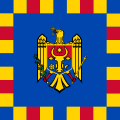Pavel Filip | |
|---|---|
 Filip in 2018 | |
| 12th Prime Minister of Moldova | |
| In office 20 January 2016 –8 June 2019 | |
| President | Nicolae Timofti Igor Dodon |
| Deputy | |
| Preceded by | Gheorghe Brega (acting) |
| Succeeded by | Maia Sandu |
| President of the Democratic Party | |
| In office 7 September 2019 –30 October 2021 | |
| Preceded by | Vlad Plahotniuc |
| Succeeded by | Monica Babuc (acting) |
| Member of the Moldovan Parliament | |
| In office 9 March 2019 –23 July 2021 | |
| Parliamentary group | Democratic Party |
| Constituency | Strășeni |
| Majority | 13,047 (45.6%) |
| In office 9 December 2014 –18 February 2015 | |
| Succeeded by | Eufrosinia Grețu |
| Parliamentary group | Democratic Party |
| In office 28 November 2010 –14 January 2011 | |
| Succeeded by | Oleg Sîrbu |
| Parliamentary group | Democratic Party |
| Minister of Information Technology and Communications | |
| In office 14 January 2011 –20 January 2016 | |
| President | Marian Lupu (acting) Nicolae Timofti |
| Prime Minister | Vladimir Filat Iurie Leancă Chiril Gaburici Natalia Gherman (acting) Valeriu Streleț Gheorghe Brega (acting) |
| Preceded by | Alexandru Oleinic |
| Succeeded by | Vasile Botnari |
| Personal details | |
| Born | 10 April 1966 Pănășești,Moldavian SSR,Soviet Union (now Moldova) |
| Political party | European Social Democratic Party (PSDE) |
| Other political affiliations | Alliance for European Integration (2009–2013) Pro-European Coalition (2013–2015) Political Alliance for a European Moldova (2015) Alliance for European Integration III (2015–present) |
| Spouse | Tatiana Filip |
| Children | 2 sons |
| Alma mater | Technical University of Moldova IMI-NOVA International Management Institute |
This biographical article is written like a résumé .(January 2022) |
Pavel Filip (born 10 April 1966) is a Moldovan politician.
Contents
In 2001–2008 he was the director of the Joint-stock company Bucuria SA and in 2008–2011, general manager of Tutun-CTC joint stock company. He was then Minister of Information and Communication Technology in the Governments headed by Filat (2), Leancă, Gaburici, and Streleț since 14 January 2011 when he replaced Alexandru Oleinic (2009–2011) and by his investment at the prime minister position on 20 January 2016. He was the deputy chairman of the Democrat Party (DPM). On 7 September 2019 at the IXth Congress of the DPM was elected for the position of the chairman of the Party. [1]
During 2019 Moldovan constitutional crisis from 9 to 15 June, Filip was acting president of Moldova.






